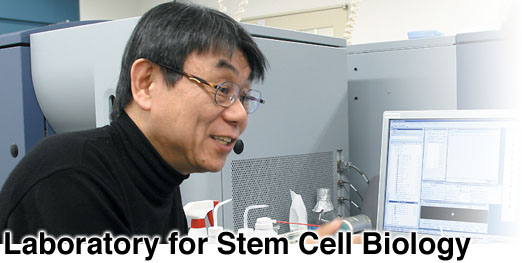




     |

Shin-Ichi NISHIKAWA, M. D., Ph. D. 
The stem cell system can be thought of as a means by which organisms maintain cell renewal. All forms of life require the endless recycling of both materials and energy, making it impossible for either organisms or individual cells to live independent of their environments. In bodies made up of many cells working in cooperation, such as our own, the need to replace and renew is not limited to simple materials and energy supply; the constant generation of new cells is also essential to the maintenance of the individual, a process that has developed in the evolution of multicellular life. In this sense, the process of cell renewal in maintaining the body's integrity and function provides a meaningful example of the relationship of the cell to the organism, the individual to the whole, which we hope to explore more fully using the biology of stem cells as our model.
We are especially interested in the question of how cells maintain the never-ending self-renewal that sustains the organism as a whole. This will require, at the very least, solving the riddles of two essential processes. The first of these is the need for old cells destined for replacement to be able to disengage or otherwise be dislocated from their environmental milieux. The second is the requirement for preparing new cells in replacement. To investigate the first of these mechanisms, our group uses a system for labeling cells with special dyes, which allows us to monitor their location and behavior. We have also developed a system for differentiating embryonic stem (ES) cells in culture to study the second question of new cell production. In addition to these two central themes, other members of the laboratory are studying angiogenesis, the formation of blood vessels, as blood supply is an absolute requirement to the establishment and maintenance of any deep or extensive biological tissue. These three ongoing research projects within our lab allow us to explore the problem of cell renewal in self-maintenance from multiple angles, an approach which we hope will provide new insights into this fundamental process.